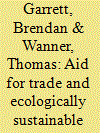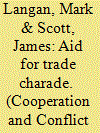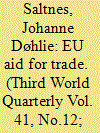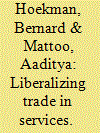| Srl | Item |
| 1 |
ID:
155440


|
|
|
|
|
| Summary/Abstract |
In September 2015, Australia, along with 193 member states of the United Nations, signed the United Nations Sustainable Development Goals. The facilitation of international trade and increasing foreign aid for developing countries were emphasised as crucial means for achieving the Sustainable Development Goals. An important role was assigned to the international Aid for Trade initiative, which is about stimulating economic growth in developing countries through removing constraints to trade. Australia has been a strong supporter of the Aid for Trade initiative since it was launched at the World Trade Organization’s Ministerial Conference in Hong Kong in 2005. Aid for trade has become a central plank of the ‘new development paradigm’ of Australia’s international aid program. This article analyses the conceptualisation and practice of aid for trade in Australia’s aid, with a focus on how it links to ecologically sustainable development. It argues that Australia’s aid for trade is reinforcing the neo-liberal development paradigm in which environmental dimensions are overall neglected and private sector development and free trade are prioritised. In order to achieve international and national development goals of poverty reduction and sustainable development, environmental sustainability needs to be fully integrated into the growing aid for trade portfolio of Australia’s international aid.
|
|
|
|
|
|
|
|
|
|
|
|
|
|
|
|
| 2 |
ID:
132326


|
|
|
|
|
| Publication |
2014.
|
| Summary/Abstract |
Aid for Trade (AfT) has gained prominence as an innovative form of donor support in the 'post'-Washington Consensus. AfT mechanisms have been praised as a means of aligning trade liberalisation deals (whether in the Doha Round or within bilaterals) to poverty reduction objectives. This article, through critical analysis of AfT discourse within the 'moral economies' of multilateral World Trade Organization and bilateral European Union-African, Caribbean and Pacific negotiations, points to the strategic purposes of donor language in rationalising asymmetric North-South trade systems. Moreover, it questions the 'development' credentials of AfT assistance by examining some of the ensuing private sector activities and the impact on the supposed beneficiaries, and the tying of AfT disbursements to the implementation of inappropriate policies.
|
|
|
|
|
|
|
|
|
|
|
|
|
|
|
|
| 3 |
ID:
175523


|
|
|
|
|
| Summary/Abstract |
Does the EU’s Aid for Trade (AfT) initiative contribute to global justice? Complementing work that considers distributive justice, in this paper we adopt the central tenets of the republican theory of non-domination as a regulative ideal for justice in international relations. We evaluate the extent to which the EU’s AfT initiative results from reduced political domination in international trade negotiations, and if that then mitigates economic dependency between European and African states. We first provide a qualitative account of the processes that led to the establishment and subsequent development of AfT. We then consider the extent to which the AfT has promoted the reliance of African states on European foreign direct investment (FDI) relative to FDI from other regions (including and especially from within Africa itself) using subnational, project-level, data. Our findings suggest that EU AfT does not reinforce dominating forms of dependency in the international arena, at least when measured by the source of the FDI that it attracts, while AfT is itself an outcome of somewhat less dominating power relations in trade negotiations between wealthier and poorer states.
|
|
|
|
|
|
|
|
|
|
|
|
|
|
|
|
| 4 |
ID:
120721


|
|
|
|
|
| Publication |
2013.
|
| Summary/Abstract |
Abstract Liberalization of trade and investment in services through trade agreements has progressed less than trade in goods. We review the limited progress achieved to date in the WTO and major regional agreements on services and possible explanations why trade agreements have not been more effective at integrating the services markets of participating countries. We argue that the prospects for both services liberalization and welfare-enhancing regulatory reform in the context of trade agreements can be enhanced through mechanisms that enhance transparency, dialogue and cooperation between regulators, trade officials and stakeholders.
|
|
|
|
|
|
|
|
|
|
|
|
|
|
|
|